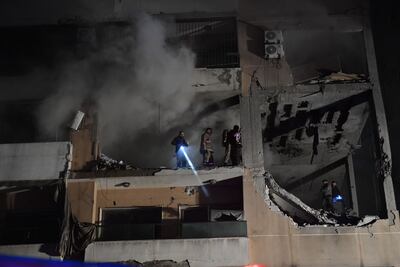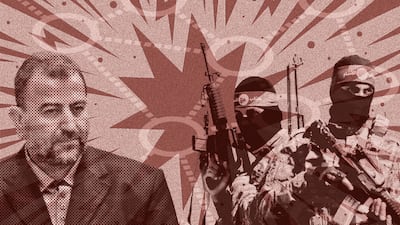Live updates: follow the latest on Israel-Gaza
Hamas's deputy leader Saleh Al Arouri, one of Israel's most wanted militants, left himself exposed in Beirut when he held a meeting with other senior Hamas officials in an office that his allies had specifically warned them against using, The National has learnt.
In early January, the senior official and six others were killed in an Israeli strike on a building housing a Hamas office in the residential Beirut suburb of Dahieh, where some leaders-in-exile of the Palestinian group reside under the protection of the powerful Hezbollah party.
Hamas, Hezbollah, Iran, and others accused Israel of assassinating Mr Al Arouri to claim a much-needed victory against the armed group as its army struggles to defeat Hamas fighters in the Gaza Strip, despite relentless air and ground assaults that have killed thousands of civilians.
“Going to the building was a reckless move. He shouldn't have gone there,” a senior Lebanese official told The National of the night Mr Al Arouri was killed in the apartment in Dahieh, a southern residential suburb of Beirut.
Mr Al Arouri, who for years had been on Israel’s kill list and was considered one of the Middle East’s most wanted men, had been living in Dahieh since 2015.
A warning by Hezbollah against using that specific building had previously been delivered to him after the Iran-backed group came to suspect that its location had become compromised to Israeli intelligence.
“Hezbollah had even delivered a written warning” to ensure the Hamas office was not used, the senior Lebanese official with close ties to Hezbollah and Hamas explained.
Mr Al Arouri’s use of the office left him vulnerable to the assassination.

Additionally, the group of Hamas officials had brought their phones, putting them at risk of Israeli surveillance.
“Altogether, there were seven phones in that meeting,” the official with deep knowledge of Lebanon's security apparatus added.
The office was also furnished with at least one computer with a Wi-Fi connection, potentially giving Israeli forces another method of locating the men.
“Once the laptop started, the strike hit the office,” said the official.
Asked if there were suspicions that an intelligence asset may have played a role in giving Israeli officials information about the meeting, he said that “the presence of that many phones is alone enough for Israel to pinpoint someone’s location”.
Hezbollah confirmed the information to The National.
“We had warned them not to use the office,” an official for the Iran-backed party said.
It was not immediately clear why the Hamas officials would use an office that had been potentially compromised, or why they would bring mobile devices to the meeting.
The National contacted several Hamas officials for comment but received no response.
Hamas-Hezbollah ties
Mr Al Arouri, along with a number of senior Hamas officials living in exile in Lebanon, resided in the southern suburb of Beirut under the auspices of the Hezbollah group.
Hamas, which governs the Gaza Strip, is a longtime ally of Hezbollah.
Mr Al Arouri – who was head of Hamas in the occupied West Bank and the deputy of Hamas political leader Ismail Haniyeh – was particularly close to Hezbollah and credited with strengthening relations between the two parties.
In December, a Hamas official told The National that a strike on members of the group’s leaders in Dahieh was unlikely, as it would signal a major escalation on Hezbollah's territory.
Hezbollah is engaged in an intense cross-border conflict with Israel from southern Lebanon in support of its ally that threatens to spill into the rest of Lebanon. The group said its conflict with Israel on the Lebanon-Israel frontier is an attempt to divert Israel – which has pledged to eradicate Hamas following the October 7 attacks – from its assault on Gaza.
Mr Al Arouri was killed along with two senior leaders in Hamas’ armed wing the Ezzedine Al Qassam Brigades: the head of military operations outside Gaza, Azzam Al Aqra, and Lebanon’s chief of operations, Samir Fendi.
The strike killed four other members of the party: Mahmoud Zaki Shaheen, Mohammed al-Rayes, Mohammed Bashasha and Ahmed Hamoud.
The assassination was first thought to have been a drone strike on the apartment building housing the Hamas office, but the latest security assessments indicate it was most likely a precision strike fired from over the Mediterranean Sea.
Lebanese security officials suspect that a stealth plane, such as an F-35, fired precision-guided missiles into the building.
“It was a plane that was not picked up on our radars,” a security official with knowledge of the Lebanese investigation into the assassination told The National. “The radars that we have are civil radars – we don’t have military radar capability that can pick up on the presence of stealth planes.”


